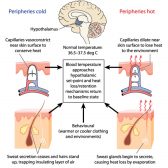Definition
Noun
A gram-positive facultative bacterium that produced slime for adhesions associated with endocarditis and septicemia in humans.
Supplement
Staphylococcus epidermidis has a sized at about 0.5-1.5 micrometers in diameter that grows in aerobic conditions. It forms biofilm that consists of clusters of cells embedded in extracellular slime with a thickness of 160 micrometers. It has glycerol teichoic acid glucosyl residues and is capable of growing with glucose anaerobically. The biofilm permits this bacterium to adhere in living areas which then releases host immune response to antigens preventing removal and tissue damage.
Staphylococcus epidermidis linked to nosocomial infections associated with intravascular devices including cerebrospinal fluid shunts, prosthetic heart valves, urinary tract and catheters that lead to severe inflammation and pus secretion.
Staphylococcus epidermidis is implicated in endocarditis and septicemia manifest by painful urination as well as extent fever, headache and fatigue susceptible to newborns, drug users, elderly and those catheter users. It is prone to contaminate environmental surfaces and patient-care equipment.
Scientific classification:
Kingdom: Bacteria
Phylum: Firmicutes
Class: Bacilli
Order: Bacillales
Family: Staphylococcaceae
Genus: Staphylococcus
Species: Staphylococcus epidermidis
See also:
• Bacteria
• Septicemia
• Endocarditis
Dictionary > Staphylococcus epidermidis
You will also like...

Genetics and Evolution
Humans are diploid creatures. This means that for every chromosome in the body, there is another one to match it. Howeve..

Sensory Systems
A sensory system is a part of the nervous system consisting of sensory receptors that receive stimuli from the internal ..

A Balanced Vitamin Diet – Vitamins A – K
A balanced diet is essential to a healthy organism. Insufficiency or too much of a particular element or compound, such ..

Temperature Regulation in Animals
This tutorial elucidates body temperature regulation. Know the details here to learn how the body sets the body temperat..

Origins of Life on Earth
Earth was created around 4.5 billion years ago and life began not long after. Primitive life likely possessed the elemen..

The Conscious & Unconscious Nervous System
This tutorial elaborates on how the nervous system works, particularly at the tissue level of the brain. There are three..

